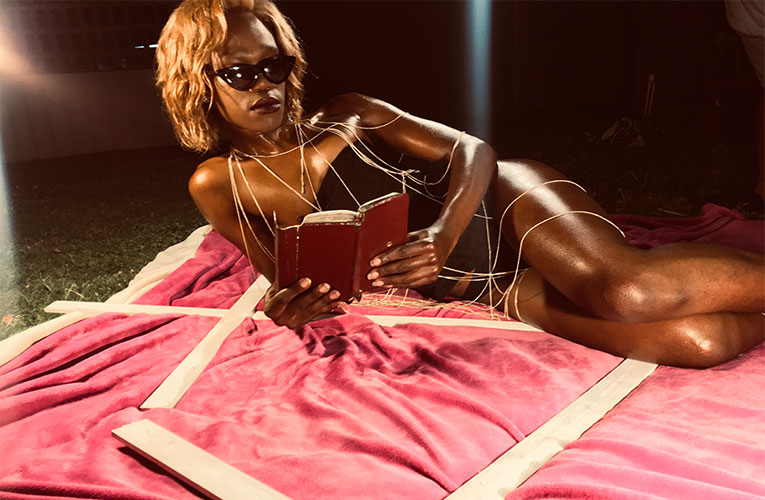Artists discuss their works after fellowship
By CityLife Arts Writer
In May of this year, the Institute for Creative Arts (ICA) launched an Online Fellowship Programme to contribute tangibly to artists and researchers’ career trajectories at this moment when art funds are dwindling, as well as to emphasise the critical role that the arts have to play in a time of change and uncertainty. 34 Fellows were appointed and invited to re-imagine an existing artwork for digital interaction. See the full programme here.
This Wednesday, 2 December 2020, four more Fellows will take us through their compelling digital renderings of their work online with Host, Dr. Portia Malatjie as well as audience members, on the Fellowship website!
 From left to right, Fellows: Lukhanyiso Skosana, Malebona Maphutse, Kresiah Mukwazhi and kyle malanda.
From left to right, Fellows: Lukhanyiso Skosana, Malebona Maphutse, Kresiah Mukwazhi and kyle malanda.
Lukhanyiso Skosana, Malebona Maphutse, Kresiah Mukwazhi and kyle malanda present projects interested in queering culture and liberating bodies. Through thematics of intersectional justice and the human right to autonomy over one’s body, these Fellows explore thematics ranging from Mmamoloyi(femme witches), to femme erotic justice and empowerment.
 Still image of Lukhanyiso Skosana’s project, The Exorcism of Mary Magdalene:
Still image of Lukhanyiso Skosana’s project, The Exorcism of Mary Magdalene:
A Sexual Resurrection.
Skosana explains her project The Exorcism of Mary Magdalene: A Sexual Resurrection asstemming from the innate exhaustion Black, queer and femme bodies exist in. She states, ”Black Queer Femme bodies are in constant performance of their identity, through the forced removal of our biography in the Cultural, Traditional and Historical Archive of this very land”. The work thus becomes an exploration of belonging, in a liminal state of placelessness. Skosana looks at the potentiality of dreams as a means of tracing one’s archival narratives. She believes that dreams are a medium utilised by those who walked before us, as a communicative tool, of explicating the narratives that are inherently found and living within our bodies.
 Sculptural artworks by Malebona Maphutse that she has digitally rendered as part of her project, We Don’t Die We Multiply: Siyagoduka Ka Spaceship Babez.
Sculptural artworks by Malebona Maphutse that she has digitally rendered as part of her project, We Don’t Die We Multiply: Siyagoduka Ka Spaceship Babez.
In We Don’t Die We Multiply: Siyagoduka Ka Spaceship Babez Maphutse explores the concept of witchcraft (Boloi/Boloyi) as stemming from a demonisation of traditional beliefs and customs. Her exploration begins with her own observation of the stigma around African spiritual and traditional practices and the privileging of a Western-translated, transferred Christianity, which have created a binary relationship between the two in the South African context. In both her project and practice, Maphutse draws from the premise of religious syncretism to realise the links, crossovers and realistic manifestations of both belief systems in the context of Johannesburg and South Africa as a whole. Her project evokes the power of both to achieve the impossible for those who believe and desperately need spiritual guidance, healing and possibilities for a better future.
 Still image of visuals from Kresiah Mukwazhi project, Hesi Keresiya.
Still image of visuals from Kresiah Mukwazhi project, Hesi Keresiya.
Hesi Keresiya (Hello Kresiah) is Mukwazhi‘s ongoing inquiry of the self and a reference to an old postcolonial Zimbabwean playtime rhyme of the same title; evidence of how Zimbabweans adjust English names to suit their context. Mukwazhi is interested in understanding the power that storytelling and images have on preserving and transforming culture. For the project, she shot videos of herself performing on wetland with contoured farms to retell where her inquiry began. Mukwazhi recalls how land was the biggest issue, causing her ancestors to move from place to place, looking for good arable land which was very difficult to come by.
 Still image of visuals from kyle malanda’s project, REWRITING GENESIS.
Still image of visuals from kyle malanda’s project, REWRITING GENESIS.
In REWRITING GENESISmalanda dreamily reimagines the Abrahamic origins of humankind in the modern day by creating moments of tenderness between Lilith & Eve, the two women believed to have been at the beginning of time. By capturing moments of care and joy between these two women who are deliberately portrayed as queer Black women, REWRITING GENESIS seeks to address the colonial demonisation and erasure of Black queer women from Abrahamic religious narratives and mythologies. Accompanied by augmented reality filters, the project draws from traditional Ngonde and Ifa religious beliefs. It is the first in a series reframing Abrahamic religions for Black people.
 Dr. Portia Malatjie who is a curator and lecturer will be hosting this week’s seminar.
Dr. Portia Malatjie who is a curator and lecturer will be hosting this week’s seminar.










